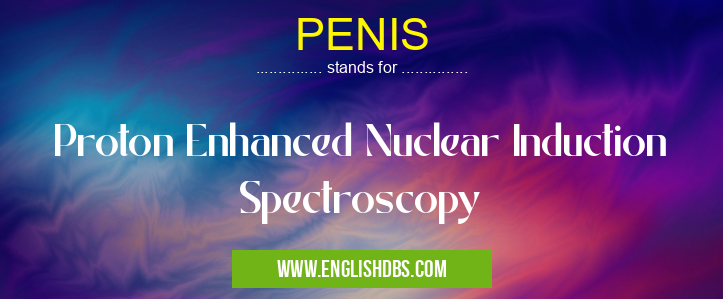What does PENIS mean in NUCLEAR
Proton Enhanced Nuclear Induction Spectroscopy (PENIS) is a nuclear magnetic resonance technique used to study the energy states of atomic nuclei. The goal of this technique is to measure the electromagnetic interactions between particles in order to gain information about their physical properties and structure. PENIS can be used to investigate the properties of magnetic materials, to elucidate the structure of complex molecules, and to detect weak signals from biological systems.

PENIS meaning in Nuclear in Academic & Science
PENIS mostly used in an acronym Nuclear in Category Academic & Science that means Proton Enhanced Nuclear Induction Spectroscopy
Shorthand: PENIS,
Full Form: Proton Enhanced Nuclear Induction Spectroscopy
For more information of "Proton Enhanced Nuclear Induction Spectroscopy", see the section below.
Operation
PENIS works by using radio frequency pulses with an alternating electromagnetic field in order to induce changes in the spin states of hydrogen nuclei inside a sample containing atoms or molecules. The induced signals are detected and analyzed to calculate various nuclear parameters such as chemical shifts, spin-spin couplings and relaxation times. Since these parameters vary depending on the surrounding environment, they can be used to analyze molecular structures or dynamics within a sample. In addition, PENIS can provide information about the different forms of energy contained within a sample, as well as its electrical and magnetic properties. In this way, PENIS allows scientists to probe dynamic processes that occur during chemical reactions or other phenomena.
Applications
PENIS has numerous applications across a wide range of scientific disciplines including chemistry, physics, material science and biomedicine. It can be used for medical imaging purposes such as detecting cancerous tumors or other abnormalities in body tissue, and it has also been applied in food science for quality control purposes. PENIS can also be utilized in studies of polymers and plastics for structural analysis or engineering purposes. Moreover, it has been employed to better understand how different types of energy interact with each other as well as how they affect matter at an atomic level.
Essential Questions and Answers on Proton Enhanced Nuclear Induction Spectroscopy in "SCIENCE»NUCLEAR"
What is Proton Enhanced Nuclear Induction Spectroscopy (PENIS)?
PENIS is a technique used to detect the composition of a sample by exposing it to a proton beam. The protons interact with the nuclei of the material, exciting them and causing them to emit gamma radiation. This gamma radiation can then be detected and analysed to determine the elements present in the material.
How does PENIS work?
PENIS works by bombarding a sample with a beam of protons. These protons interact with the nuclei in the material, which causes them to become excited and emit gamma radiation as they relax back down to their original energy state. This gamma radiation can then be detected and analysed in order to identify what elements are present in the sample.
What types of materials can PENIS be used for?
PENIS can be used on a wide variety of materials, from metals to polymers, minerals, ceramics, chemicals and biological substances. It is particularly useful for identifying trace elements or contaminants that aren’t easily detectable through other methods.
What types of information can be obtained from PENIS?
PENIS can provide information about elemental composition, including relative concentrations of trace elements or contaminants present in a sample. It can also provide information about molecular structures on particular surfaces or layers within samples.
Are there any drawbacks associated with using PENIS?
As with most analytical techniques, there are some drawbacks associated with using PENIS such as technological limitations and costs associated with purchasing and maintaining specialised equipment for use in this technique. Additionally, its effectiveness may vary depending on the characteristics of each individual sample being analysed.
Is PENIS suitable for all applications?
While PENIS is an effective analytical tool for many applications, it may not always be suitable depending on your specific requirements; other techniques such as X-ray diffraction may provide more detailed results in some cases so it’s important to consider your options before choosing which technique will best suit your needs.
What kind of training is necessary before using PENIS?
As with any analytical technique that requires specialized equipment, using PENIS requires a certain level of technical knowledge and understanding about how it works; you should ensure that you have received appropriate training from an experienced operator before attempting to use this technique yourself or trusting someone else who has not received adequate training.
Is there any safety protocols when using Proton Enhanced Nuclear Induction Spectroscopy (PENIS)?
Yes - it is important that safety protocols are observed when working with nuclear-based techniques such as PENIS; protective clothing should always be worn when handling samples and good laboratory practice maintained throughout analysis processes at all times.
Final Words:
In conclusion, Proton Enhanced Nuclear Induction Spectroscopy (PENIS) is an important and widely applicable tool for studying various aspects related materials such as their electrical, magnetic and thermal properties; their chemical composition; dynamics related phenomena; medical imaging applications; and more. By utilizing radio frequency pulsing techniques combined with electromagnetic fields it allows researchers to obtain detailed data regarding atomic nuclei which enables them gain valuable insights into numerous scientific disciplines ranging from chemistry and physics all the way up to life sciences.
